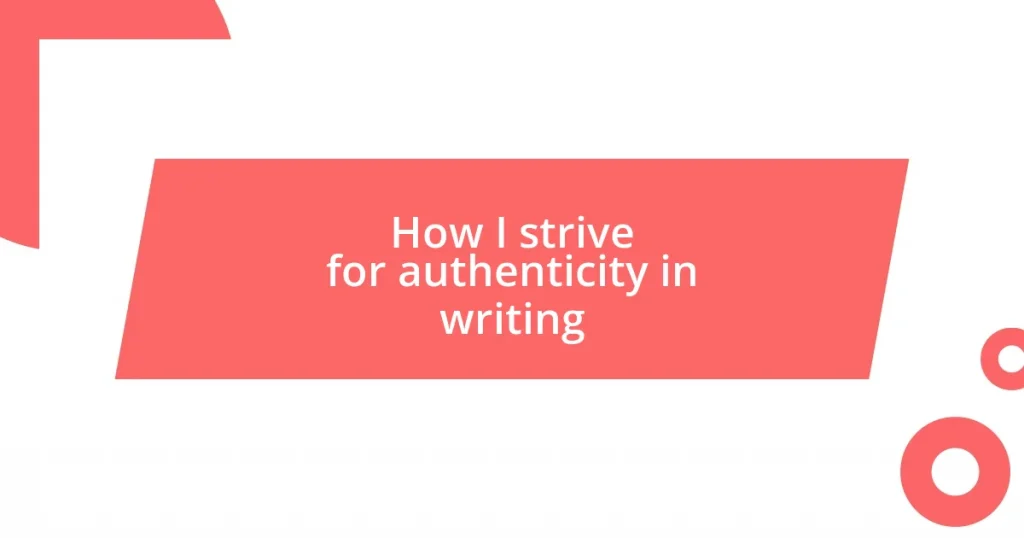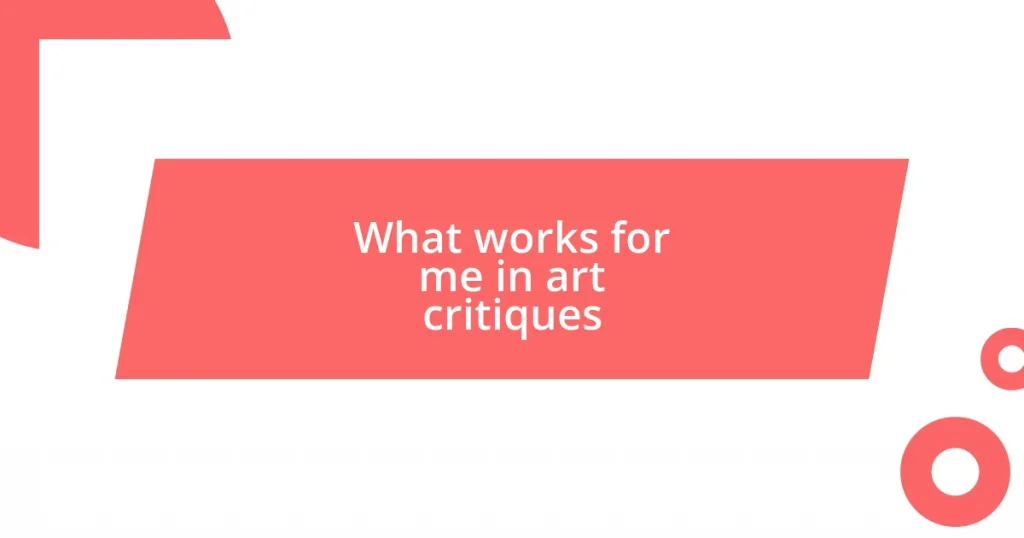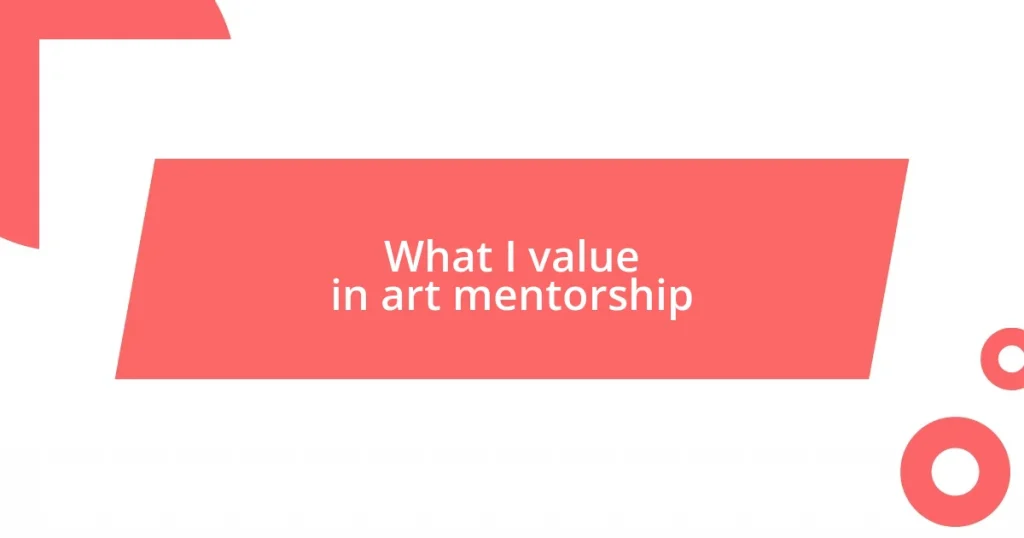Key takeaways:
- Authenticity in writing stems from being true to oneself, expressing genuine emotions, and embracing vulnerability to foster deeper connections with readers.
- Developing a personal voice and consistent writing style enhances clarity and trust, allowing writers to convey their unique perspectives and experiences effectively.
- Self-reflection techniques, such as journaling, conversations, and meditation, are crucial for uncovering insights and shaping narratives that resonate with both the writer and their audience.
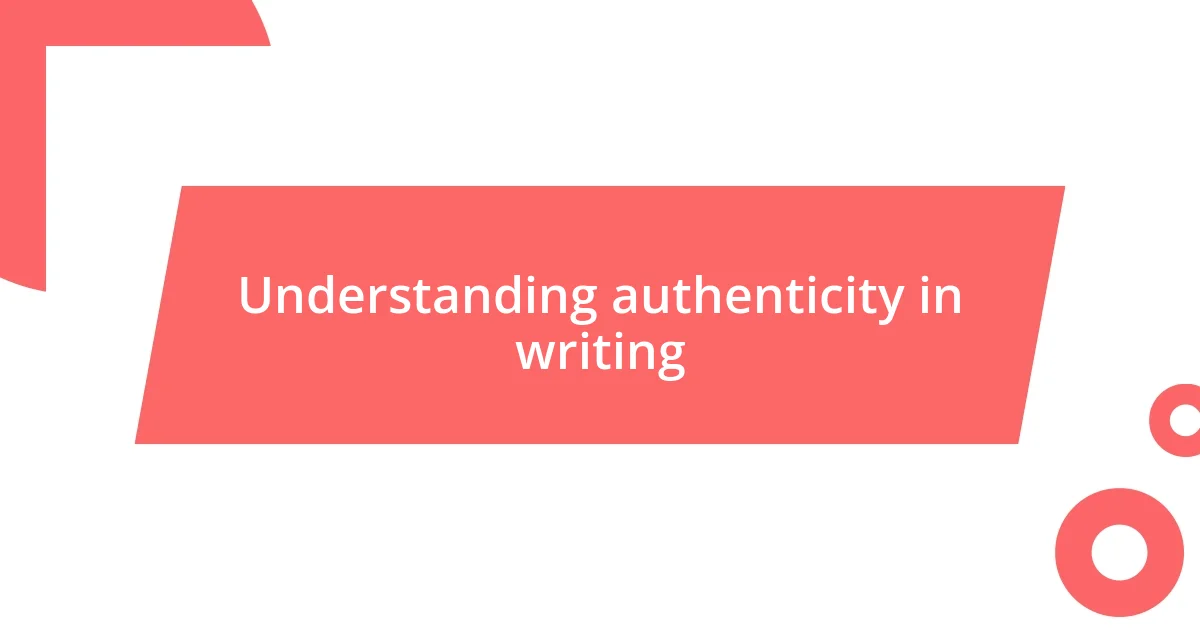
Understanding authenticity in writing
Authenticity in writing often centers around being true to oneself and conveying emotions genuinely. I remember a time when I wrote a piece on a personal experience that left me exposed. Sharing those vulnerabilities not only resonated with my readers but also allowed me to embrace my true voice. Have you ever felt that rush when your words really reflect who you are?
Real authenticity goes beyond simply sharing experiences; it requires commitment to honesty and integrity in your expressions. I’ve often found myself questioning whether the words on the page genuinely reflect my thoughts or if I’m just writing what I think others want to hear. This reflection often leads to deeper connections and a sense of relief when I finally voice what’s in my heart.
Understanding authenticity also means recognizing that it’s not always easy—it can feel daunting to lay bare your truths. I had a draft once filled with polished phrases and clever metaphors, but it felt hollow. When I stripped it back, sharing the raw, unvarnished truths instead, my words came alive. Isn’t it fascinating how sometimes the simplest expressions can pack the most emotional punch?
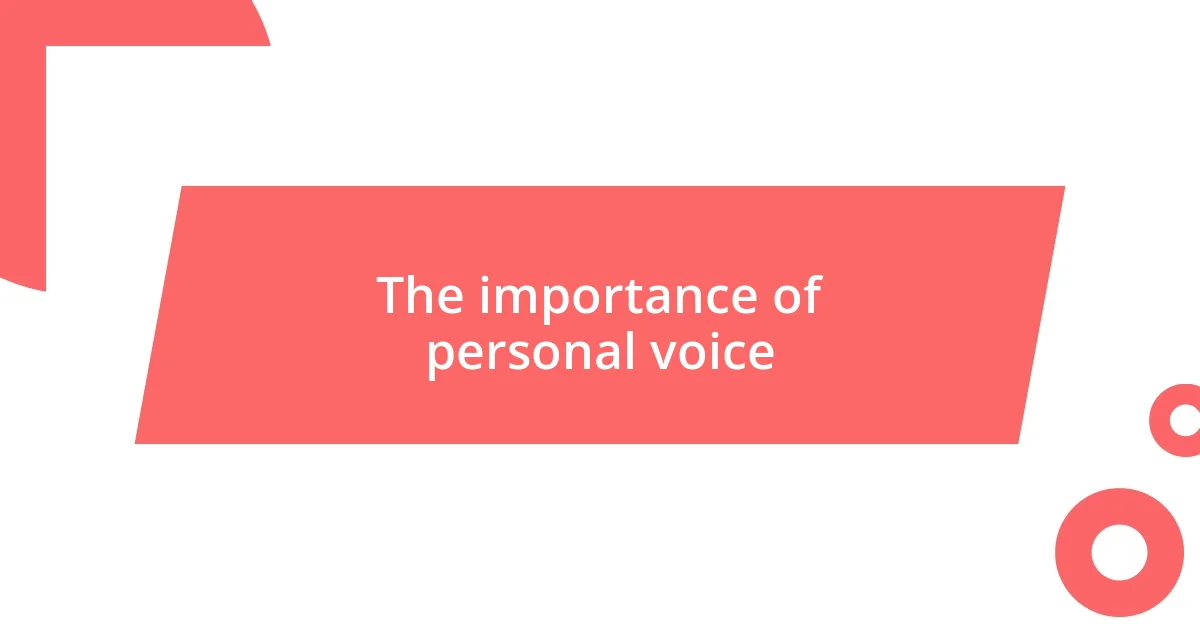
The importance of personal voice
Having a personal voice in writing is crucial because it sets you apart from a sea of voices. I recall a time when I attempted to mimic a popular writing style I admired, thinking it would garner more attention. Instead, the piece seemed disingenuous, reflecting someone else’s ideas rather than my own. That experience taught me that authenticity not only connects with readers but also helps me evolve as a writer.
- It fosters deeper connections with your audience.
- Your unique perspective enriches the conversation.
- Readers can sense when the voice is genuine, creating trust.
- Authenticity allows for personal growth and exploration in your craft.
In essence, writing with a personal voice gives readers an intimate window into your thoughts and feelings. I remember receiving a heartfelt message from a reader who said my words made them feel less alone in their struggles. That moment reaffirmed my belief in the importance of being true to myself; it reminded me that our stories can resonate and inspire when we allow our true selves to shine through.
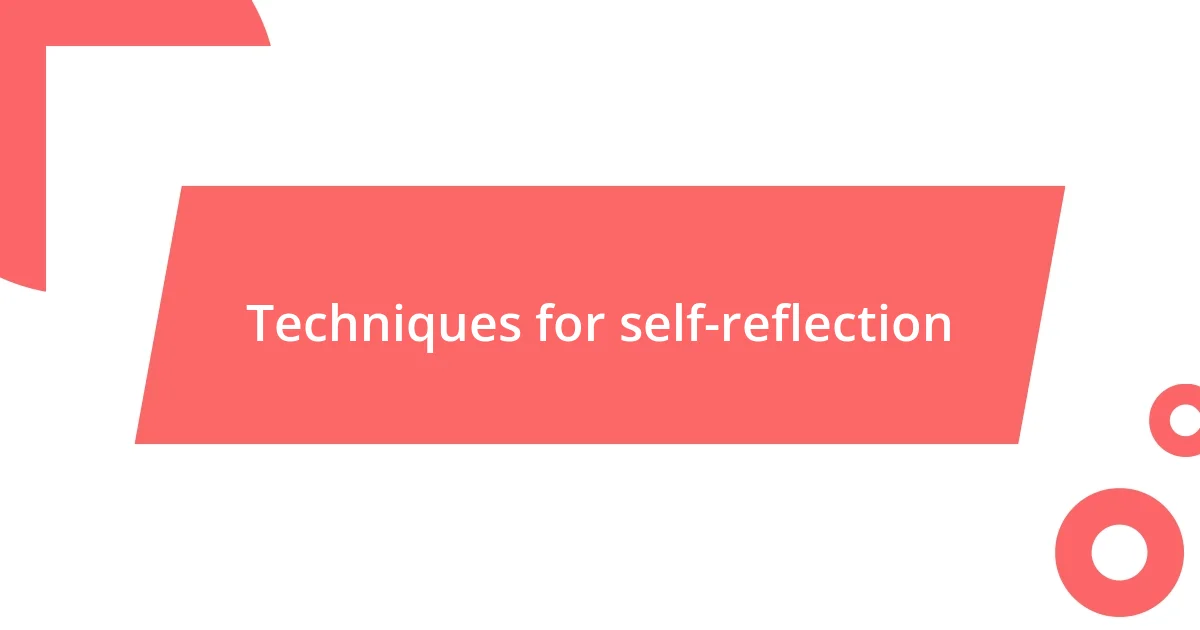
Techniques for self-reflection
Self-reflection is a cornerstone of authentic writing. One technique I often utilize is journaling, where I pour out my thoughts without any filters. A few months back, during a particularly challenging week, I filled pages with my emotions—frustration, joy, and confusion. This exercise revealed patterns in my thinking that I never noticed before. It became clear how my feelings shaped my writing. Have you ever tried this? It’s astounding what your subconscious might reveal.
Another powerful method for self-reflection is engaging in conversations with trusted friends or fellow writers. I remember one late-night chat with a close friend where I shared my latest piece. As I spoke, I realized that my words felt stilted. My friend helped me see that I was still too wrapped up in self-doubt. By discussing my intentions behind the writing, I uncovered layers of meaning I hadn’t shared in the original draft. Isn’t it interesting how an outside perspective can illuminate your own thoughts?
Lastly, meditation has become a vital part of my creative process. During a quiet session, I focus on what truly matters to me and ask myself probing questions about my writing. One specific afternoon, while meditating, I contemplated what story I wanted to tell next. The clarity that emerged was striking; I realized I wanted to write about resilience. It wasn’t just about what I wanted to say; it was about what I needed to explore. The deep insights gained through self-reflection can shape not only the narrative but the very essence of who we are as writers.
| Technique | Description |
|---|---|
| Journaling | A free-flow writing process that uncovers subconscious thoughts and emotional patterns. |
| Conversations | Engaging discussions with trusted individuals can reveal insights and challenge self-doubt. |
| Meditation | A reflective practice that helps clarify intentions and explore deeper narratives. |

Embracing vulnerability in storytelling
Embracing vulnerability in storytelling is about laying bare parts of ourselves that often feel raw and exposed. I vividly remember sharing a story about my childhood insecurities. It was daunting, and yet, I was overwhelmed by the support and understanding I received. When I stepped into that vulnerable space, I created a bridge to my readers, allowing them to feel my experiences as deeply as I had felt them. Isn’t it fascinating how our own struggles can unite us?
Opening up in writing doesn’t just benefit the audience; it also fosters our growth as creators. The more I reveal, the more I discover about my true self. This was especially true when I tackled a piece about grief. At first, it felt terrifying to dive into such a personal topic, but doing so enriched my narrative and deepened my connection with readers who had faced similar losses. Have you ever shared a personal challenge and felt an unexpected release from it?
The beauty of vulnerability lies in its power to evoke empathy. I recall a heartfelt response from a reader who shared how my story about overcoming anxiety helped him cope during his struggles. His words mirrored my own journey, highlighting a collective experience that often goes unspoken. It’s moments like these that remind me just how significant it can be to embrace our vulnerabilities—not only for our sake but for the sake of those who may feel unseen in their own battles.

Developing a consistent writing style
Developing a consistent writing style is essential for establishing a connection with readers. I’ve found that consistency not only enhances clarity but also builds trust. For instance, I intentionally use shorter sentences in my drafts to ensure that my main ideas shine through. Have you ever noticed how a well-structured piece feels welcoming? That’s what I strive for.
Another aspect of my writing journey has been setting a specific tone that reflects my personality. A few years back, I experimented with a more formal style, yet it felt unnatural—like wearing a coat two sizes too big. I ultimately returned to a conversational tone, which felt like slipping into a favorite pair of shoes. This revelation made me realize that authenticity shines brightest when we write in a way that feels true to ourselves.
I also pay attention to recurring themes and language choices across my work. For example, my fascination with nature often leads me to incorporate vivid descriptions that evoke sensory experiences. One memorable piece I wrote about hiking through a dense forest allowed me to express feelings of tranquility and introspection. It hit me then how embracing my preferences could create a signature style. What’s your unique angle? Finding it can truly elevate your writing.

Seeking feedback for authenticity
Seeking feedback is integral to my journey toward authenticity in writing. I remember when I first shared a draft with my writing group, feeling that familiar pit in my stomach. The feedback I received was honest but constructive, and it helped me see parts of my work that felt genuine while revealing sections that missed the mark. Doesn’t it feel freeing to have others hold up a mirror to your creative spirit?
I’ve learned that feedback isn’t just about correcting mistakes; it’s a source of inspiration. For instance, a colleague once pointed out that a particular metaphor I used resonated deeply with them because it mirrored their own experience. This moment sparked a profound realization: my authenticity is often amplified through others’ interpretations of my thoughts. Have you ever noticed how someone else’s perspective can shift your understanding of your work?
If I’m being honest, I often find myself returning to the same group of trusted readers for their insights. Their familiarity with my style makes their feedback all the more valuable. It’s comforting to have a support system that understands where I’m coming from, but it also pushes me to explore avenues I may not have considered. That balance between comfort and challenge is key in the pursuit of authenticity; what about you—who do you trust to guide you on your journey?

Overcoming challenges in honest writing
Overcoming the challenges of honest writing often requires confronting my own fears. I vividly recall a time when I hesitated to write about a personal loss. The thought of exposing such vulnerability made my heart race. But as I finally put those feelings into words, I found relief in the authenticity that emerged. Have you ever felt that rush of truth when you dared to share something raw?
Another hurdle is balancing honesty with the potential impact on others. When I wrote about my experiences with friends, I struggled to remain truthful without causing hurt. It wasn’t until I adopted a more reflective approach, focusing on my feelings rather than their actions, that I found a way to write with integrity. I learned that it’s possible to be honest without being harsh. How do you navigate the fine line between truth and compassion in your writing?
There’s also the challenge of self-doubt. Sometimes, I look at my drafts and wonder if anyone will relate to my thoughts. During those moments, I remind myself that writing is a conversation. I often visualize my readers and what they might feel, which helps me push through the uncertainty. Isn’t it fascinating how changing our perspective can energize our creative process? Embracing these challenges has only deepened my commitment to authentic writing.










